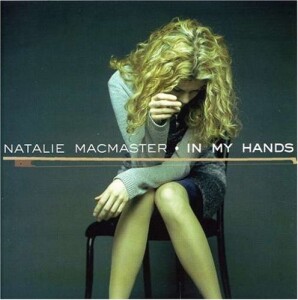 Chuck Lipsig wrote this review.
Chuck Lipsig wrote this review.
“Wow!” If I could get away with a one word review of Natalie MacMaster‘s latest CD, In My Hands, that would be it. Usually, when I review a CD, I listen to it one or two times before I write the review, taking notes the first time. Then, I listen to it again, as I’m writing the review. However, in the case of In My Hands, I’ve been listening to it almost every time I’ve sat down at the computer, between first listening to it and writing the review.
The CD leads off with the title track, which is MacMaster’s love song to her fiddle, with her alternating between reciting her lyrics and playing the traditional tune “The Drunken Landlady.” For all the electronic back-up, this still has a timeless sound and feels closely tied to tradition.
“Welcome to the Trossachs” is a set of six traditional and trad-style tunes that starts out at a moderate pace with the set’s title tune. It slowly builds, adding speed and electronic back-up, until the last tune, J. Scott Skinner’s “The Hurricane,” is being played to match the title. “Gramma” starts off with a recording of Natalie’s grandmother, and then turns into a straight-ahead playing of “Maudabawn Chapel” and “Frank’s Reel.”
Natalie’s rendition of “Blue Bonnets Over the Border” is something special. With strong back-up, this becomes a soft rock instrumental with Natalie’s lovely fiddling soaring above the rest. “New York Jig” is a sprightly set, notable for accordionist extraordinaire Sharon Shannon joining the party.
“Flamenco Fling,” an attempt to combine Celtic and Latin styles, is the only track on the CD that doesn’t come off well. MacMaster’s fiddling is excellent as always, but the flamenco-style back-up feels tacked on. “Space Ceilidh” avoids a similar fate by keeping the sci-fi sound effects to a minimum after a little space noise in the introduction. “The Night We Had the Goats” is one of the more interesting names for a tune I’ve seen.
“Olympic Reel” is a more American tune with some old-time fiddling. How much of this fiddling is MacMaster’s and how much is by the tune’s composer, old-time fiddling champion Mark O’Connor, is uncertain. Either way this is a very good tune. “Father John McLeod’s Jig” is a subtle, tricky tune that (I think) keeps slipping between normal and slip jig times (6/8 and 9/8, for those keeping score at home). MacMaster’s playing is effortlessly beautiful.
“Get Me Through December” features noted bluegrass singer (and fiddler, though not on this album) Alison Krauss singing lyrics set to a melody based on “Neil Gow’s Lament For the Death of His Second Wife.” This really is Krauss’ track with MacMaster playing a supporting role through fiddle bridges between verses. While it is well-done, it doesn’t quite fit in with the rest of the CD. On the other hand, if you get an opportunity for Allison Krauss to sing, you should take it.
“The Farewell” is comprised of a slow march and three reels. Sharon Shannon is again on accordion here, starting off the track with a nice solo. However, it is Denis Keldie’s organ-playing on the reels that kicks the energy level up, especially during some of his gospel-blues licks towards the end.
“Moxham Castle” is a good, straightforward five-reel sequence, performed with a lot less backup than many of the tracks on this CD. “Mom’s Jig” is interesting for jumping back and forth from having straightforward fiddle and guitar, to electronic backing, and back to acoustic, ending with an interesting drum solo from Al Cross. The CD ends, all too soon, with “Flora MacDonald.” This may be MacMaster’s best performance on the CD, as she creates a lot of energy out of the slow quiet tune with just a touch a jazziness to her playing.
There are, by my quick count, about 40 musicians who contribute to this CD. However, with the exception of “Get Me Through December,” this is Natalie MacMaster’s show. And it is an incredible show with MacMaster demonstrating why she is one of the top Celtic fiddlers going today.
(Rounder, 1999)
